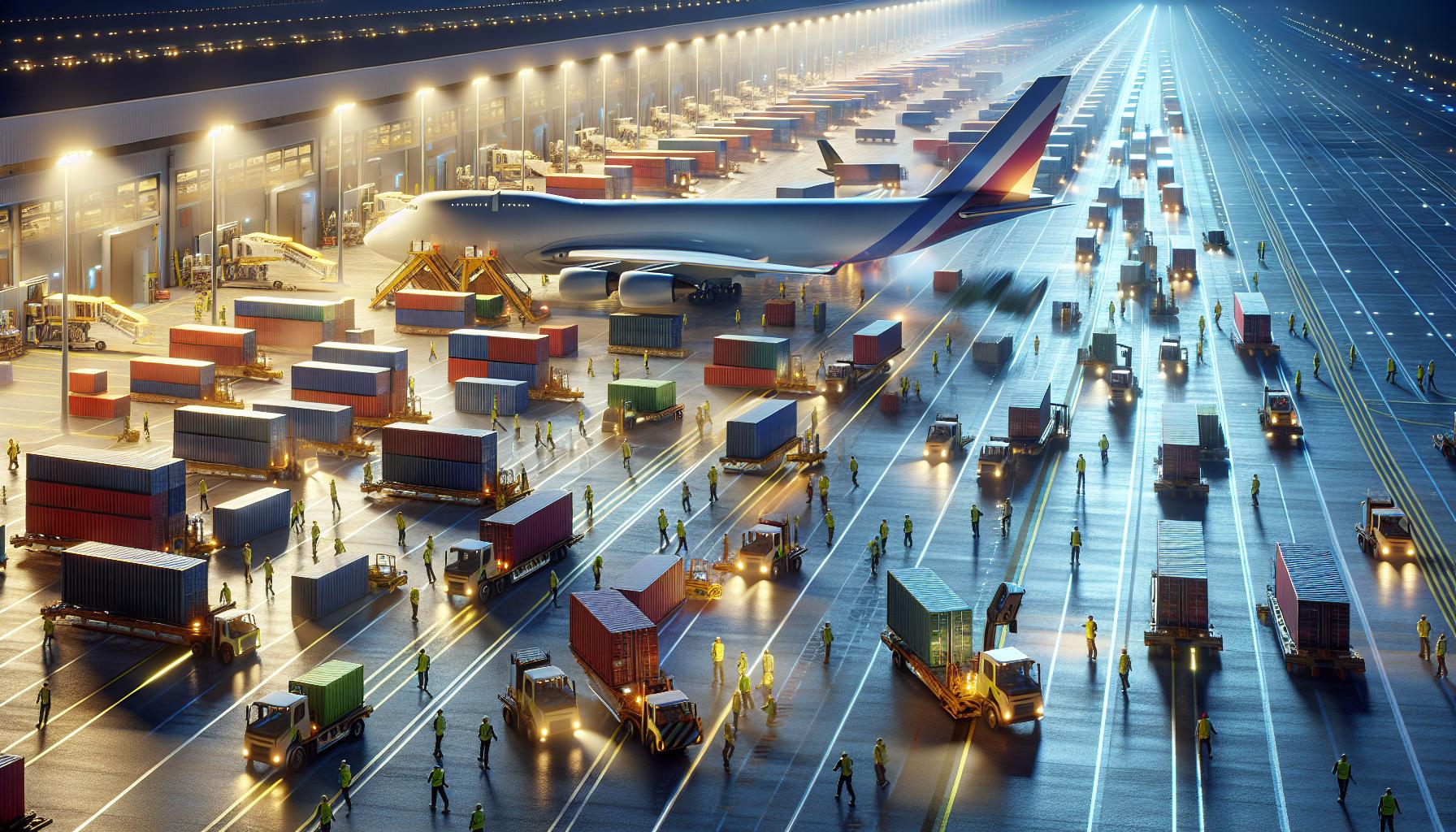Air freight forwarders play a crucial role in the global supply chain, managing the complex logistics of shipping goods by air. They act as intermediaries between shippers and airlines, ensuring timely and efficient transport of products across borders. Services like those from Twings Supply Air Freight simplify these processes, offering tailored solutions for various industries.
Understanding Air Freight Forwarders
Air freight forwarders facilitate the transportation of goods by air, acting as intermediaries between shippers and carriers. Their expertise streamlines logistics, ensuring timely and efficient shipping.
Definition of Air Freight Forwarder
An air freight forwarder is a company responsible for arranging the transportation of cargo via air. They coordinate shipments for businesses, managing the necessary documentation, handling customs clearance, and securing space on aircraft. Air freight forwarders offer services for different types of cargo, including perishables, electronics, and hazardous materials.
Role in Logistics
Air freight forwarders play a pivotal role in logistics by managing the entire shipping process. They assess client needs, select appropriate carriers, and negotiate shipping rates. Forwarders ensure compliance with international shipping regulations, reducing delays or penalties. They also track shipments and provide clients with updates, enhancing transparency throughout the logistics journey. By optimizing transport routes and consolidating shipments, air freight forwarders help businesses reduce costs while maintaining supply chain efficiency.
Benefits of Using Air Freight Forwarders

Air freight forwarders provide several advantages for businesses involved in international shipping. Their expertise enhances efficiency and compliance, crucial for a smooth logistics process.
Speed and Efficiency
Air freight forwarders streamline the shipping process, significantly reducing transit times compared to other methods. They coordinate logistics to ensure prompt delivery, which is essential for time-sensitive shipments. By utilizing established relationships with airlines, they secure priority booking and optimal routing for cargo. This approach minimizes delays and maximizes reliability, allowing businesses to meet their deadlines effectively.
Expertise in Regulations
Air freight forwarders possess extensive knowledge of international shipping regulations and requirements. They handle complex documentation and customs processes, ensuring compliance with local and global laws. Their expertise reduces the risk of errors that could result in penalties or shipment delays. By staying updated on changes in regulations, air freight forwarders help businesses navigate the complexities of international trade seamlessly.
How Air Freight Forwarders Operate
Air freight forwarders play a crucial role in ensuring efficient cargo transport through careful planning and execution of multiple processes.
Booking Process
Air freight forwarders initiate the booking process by assessing shipment requirements. They gather details such as weight, dimensions, destination, and desired delivery timelines. Based on this data, they select suitable carriers and secure space on flights that align with client schedules. Forwarders negotiate rates with airlines to provide competitive pricing, ensuring transparency in costs. They communicate promptly with clients to confirm bookings and address any changes or updates throughout the transport.
Documentation Requirements
Air freight forwarders manage all necessary documentation to comply with regulatory standards. They prepare and submit essential documents, including the air waybill, commercial invoices, and export permits. Each document must accurately reflect the shipment details to avoid customs delays. Forwarders ensure that all paperwork meets local and international regulations, significantly reducing the risk of penalties. By closely monitoring documentation compliance, they facilitate smooth customs clearance and expedite the shipping process, optimizing delivery times for their clients.
Choosing the Right Air Freight Forwarder
Selecting an air freight forwarder involves careful consideration to ensure effective logistics management. Properly assessing options guarantees businesses achieve their shipping goals efficiently.
Factors to Consider
- Reputation: Research the air freight forwarder’s track record. Verify their reliability through online reviews and testimonials from previous clients.
- Experience: Evaluate the forwarder’s expertise in air shipping, particularly in the specific industry. Experienced forwarders provide valuable insights into market trends and regulations.
- Services Offered: Examine the range of services available, including customs clearance, packaging, and insurance options. A comprehensive service portfolio can improve overall efficiency.
- Pricing Structure: Analyze the forwarder’s pricing model, including any hidden fees. Clear and transparent pricing fosters trust and allows for accurate budgeting.
- Network Strength: Consider the forwarder’s connections with airlines and agents across relevant regions. A strong network facilitates more flexible shipping solutions and better rates.
- Technological Capabilities: Look for forwarders that utilize advanced tracking systems and management software. Technology improves visibility and accuracy throughout the shipping process.
- What services do you provide? Understanding the complete offerings helps align expectations with service capabilities.
- How do you handle customs clearance? Proper customs processes minimize delays and facilitate smooth international shipping.
- Can you provide references? Requesting contacts from previous clients can validate the forwarder’s claims and build confidence in their service.
- What lead times can I expect? Knowing estimated delivery timelines is essential for planning and inventory management.
- How will communication be managed during the shipping process? Ensure open channels of communication for timely updates and issue resolution.
- What happens if delays occur? Understanding the forwarder’s contingency plans is crucial for risk management.
Careful evaluation of these factors and inquiries leads to informed decision-making in choosing an air freight forwarder, which addresses both logistical efficiency and cost-effectiveness.
Conclusion
Air freight forwarders play a vital role in modern logistics. Their expertise ensures that goods are transported efficiently and in compliance with international regulations. By managing the complexities of air shipping they help businesses navigate potential pitfalls and streamline operations.
Choosing the right air freight forwarder can significantly impact a company’s supply chain efficiency and cost-effectiveness. With the right partner businesses can improve their shipping processes and achieve faster delivery times. This not only improves customer satisfaction but also strengthens their competitive edge in the global market.
Frequently Asked Questions
What is an air freight forwarder?
An air freight forwarder is a company that coordinates the transportation of cargo by air, acting as an intermediary between shippers and airlines. They manage logistics, documentation, customs clearance, and secure space on aircraft to ensure efficient shipping.
How do air freight forwarders enhance supply chain efficiency?
Air freight forwarders streamline logistics by optimizing transport routes, consolidating shipments, and negotiating favorable rates. Their expertise reduces transit times and ensures compliance with international regulations, thus enhancing overall supply chain efficiency.
Why should businesses use air freight forwarders?
Using air freight forwarders allows businesses to benefit from their logistical expertise, reduced shipping costs, and faster transport times. They handle complex customs processes and documentation, minimizing delays and risks associated with international shipping.
What should I consider when choosing an air freight forwarder?
When selecting an air freight forwarder, consider their reputation, industry experience, range of services, pricing structure, network strength, and technological capabilities. Asking about their customs handling and communication processes can also help in making an informed decision.
How do air freight forwarders handle customs clearance?
Air freight forwarders manage and submit all necessary documentation for customs clearance. They ensure compliance with local and global regulations, track shipments, and address any issues that may arise, helping to avoid unnecessary delays and penalties.
What are the benefits of using air freight forwarders over other shipping methods?
Air freight forwarders significantly reduce transit times compared to other methods by securing priority bookings with airlines and streamlining logistics. Their expertise also minimizes the risk of errors in documentation, ensuring smooth transport across borders.
How do air freight forwarders negotiate shipping rates?
Air freight forwarders assess shipment requirements and gather details before negotiating rates with various airlines. Their industry knowledge and relationships with carriers allow them to secure competitive pricing for their clients.
What role does technology play in air freight forwarding?
Technology enhances air freight forwarding by improving communication, tracking shipments, and managing documentation. Forwarders leverage specialized software to streamline operations, ensuring timely updates and transparency for their clients throughout the shipping process.

